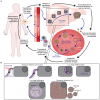The Promise of Systems Biology Approaches for Revealing Host Pathogen Interactions in Malaria
- PMID: 29201016
- PMCID: PMC5696578
- DOI: 10.3389/fmicb.2017.02183
The Promise of Systems Biology Approaches for Revealing Host Pathogen Interactions in Malaria
Abstract
Despite global eradication efforts over the past century, malaria remains a devastating public health burden, causing almost half a million deaths annually (WHO, 2016). A detailed understanding of the mechanisms that control malaria infection has been hindered by technical challenges of studying a complex parasite life cycle in multiple hosts. While many interventions targeting the parasite have been implemented, the complex biology of Plasmodium poses a major challenge, and must be addressed to enable eradication. New approaches for elucidating key host-parasite interactions, and predicting how the parasite will respond in a variety of biological settings, could dramatically enhance the efficacy and longevity of intervention strategies. The field of systems biology has developed methodologies and principles that are well poised to meet these challenges. In this review, we focus our attention on the Liver Stage of the Plasmodium lifecycle and issue a "call to arms" for using systems biology approaches to forge a new era in malaria research. These approaches will reveal insights into the complex interplay between host and pathogen, and could ultimately lead to novel intervention strategies that contribute to malaria eradication.
Keywords: computational modeling; liver; malaria; omics-technologies; plasmodium; systems biology.
Figures


References
Publication types
Grants and funding
LinkOut - more resources
Full Text Sources
Other Literature Sources
Miscellaneous

